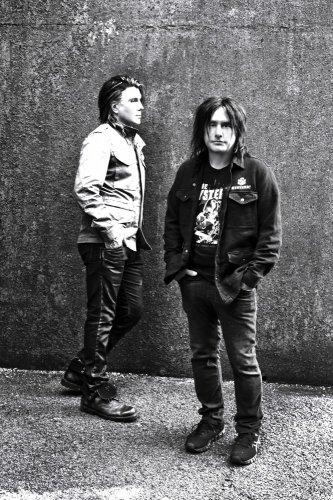The Goo Goo Dolls for a renewed relationship from the ashes of a legit disaster
Interview • October 22, 2018 • Chicago Tribune
By 2014, the 34-year friendship between John Rzeznik and Robby Takac had frayed to the point of zero communication. That was a problem since they were still playing in the same band, the Goo Goo Dolls, which had peaked in the '90s with the MTV hits "Name" and "Iris." "I don't think we ever stopped caring about each other," Rzeznik recalls, in a 15-minute phone interview from a Boston tour stop. "But there were points in time where he was a disaster and I couldn't deal with it, and there were points in time where I was a disaster and he couldn't deal with me."
For Rzeznik, who is married and has a nearly 2-year-old daughter, the change-my-life moment came in November 2014, when he drank himself into unconsciousness. Upon reawakening, he checked himself into a rehab center and spent three months getting sober. "I got away from everything and everybody until I felt like I could function," he says. "And then I called (Takac) on the phone and said, 'I want to meet you and talk to you.' I apologized for my part of what went wrong in our relationship and he apologized for his part and then it was sort of left behind."
Since that crucial healing period, the Goo Goo Dolls have put out 2016's "Boxes" and this year's live "The Audience Is Way." For its new tour the band is revisiting a 20-year-old album, "Dizzy Up the Girl," the result of a difficult period of attempting to follow up the smash success of "Name." The album with the young woman lying face down on the bed in a dress on the cover was full of pop hits that were written in surprisingly complicated ways, beginning with the ballad "Iris."
"The songs on that record don't sound like it, but the guitar parts are deceptively hard," Rzeznik says. "I sat and listened to the album and I'm like, 'Oh, I know what I did there.' ... It helped me understand my process of writing a lot better, sitting there relearning these songs. It's like closing the door on a part of us -- once it's done, you carefully, lovingly put it away, and move on."
Rzeznik grew up in Buffalo, NY, with a father who was an abusive alcoholic and a mother who was, as he once told the Buffalo News, a "German disciplinarian." He had a tough childhood, but discovered music at age 13, first by playing the accordion for exactly one week, then shifting to an electric guitar and amplifier his mother had bought him. Then his father had a heart attack and died of pneumonia in the hospital; his mother died of a heart attack a year later.
At 16, he coped by playing obsessively, then hooked up with Takac to form the Sex Maggotts, which morphed into the Goo Goo Dolls. They specialized in fast-and-loud punk rock, spicing up their early albums with covers of the Rolling Stones' "Gimme Shelter" and Blue Oyster Cult's "(Don't Fear) the Reaper." On 1989's "Jed," Rzeznik took over from Takac on lead vocals.
"There was a moment where I got brave enough to go up and get in front of a microphone. I'd been in the studio and I'd had a few drinks. And I started singing all the songs I was writing, over time," Rzeznik recalls. "I was doing that for a couple of years, and I had to start taking singing lessons because I would lose my voice every other day, just screaming as hard as I could."
After another couple of albums, the band shifted directions, and Rzeznik began to write more acoustic, catchy pop songs that were easier on his voice -- one of his first such compositions was 1995's "Name," a slick, soulful smash in an era of gritty grunge and metal. "I just followed my own lead. I got really sick of playing just, like, 'Bop-bop-bop-bada-bop-bop-bada-rapa-pah,'" he says, imitating the rhythmic sounds of punk bands. "Just playing that 190-beats-per-minute punk-rock songs, I didn't feel it anymore. And I always loved melody -- when you looked back on those early records, there's always a hook buried in there somewhere.
"We took some s--- for it, but who cares?" he continues. "I wanted to say something. I was just like, 'You know what? I've got to do what I do.'"
The Dolls peaked commercially in the late '90s, then started to droop when 2002's "Gutterflower" sold disappointingly and bands like Train and Maroon 5 began to do similar mixtures of pop and rock with younger faces on the album covers. They were always a strong concert draw, though, and the Rzeznik-Takac partnership survived a lengthy difficult period. The band had moved from New York to Los Angeles just before recording "Dizzy Up the Girl," but Takac returned to the East Coast in 2005 and Rzeznik landed in Westfield, NJ, 10 years later.
"In the time since I've gotten sober, we've put out two albums and I built a house and did a couple of tours and had a daughter who's going to be 2," Rzeznik says. "And my friend Robby actually calls me to say hi."
Related
-
Record